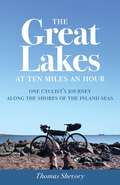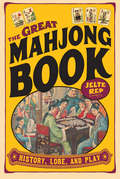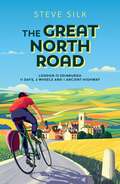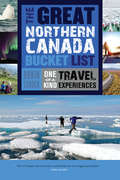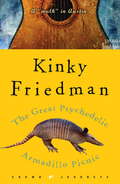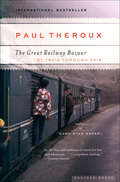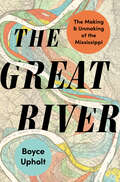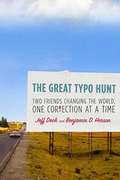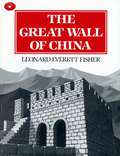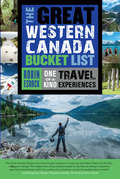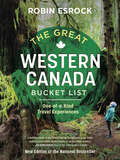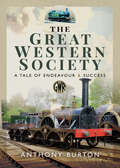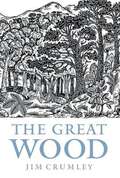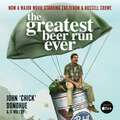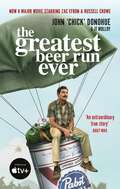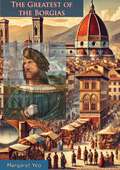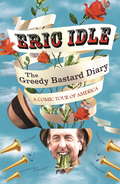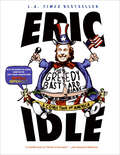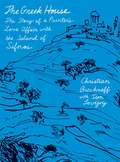- Table View
- List View
The Great Lakes at Ten Miles an Hour: One Cyclist's Journey along the Shores of the Inland Seas
by Thomas ShevoryThe Great Lakes are a remarkable repository of millions of years of complex geological transformations and of a considerably shorter, crowded span of human history. Over the course of four summers, Thomas Shevory rode a bicycle along their shores, taking in the stories the lakes tell—of nature&’s grandeur and decay, of economic might and squandered promise, of exploration, colonization, migration, and military adventure. This book is Shevory&’s account of his travels, shored up by his exploration of the geological, environmental, historical, and cultural riches harbored by North America&’s great inland seas.For Shevory, and his readers, his ride is an enlightening, unfailingly engaging course in the Great Lakes&’ place in geological time and the nation&’s history. Along the northern shore of Lake Huron, one encounters the scrubbed surfaces of the Canadian Shield, the oldest exposed rock in North America. Growing out of the crags of the Niagara Escarpment, which stretches from the western reaches of Lake Michigan to the spectacular waterfalls between Erie and Ontario, are the white cedars that are among the oldest trees east of the Mississippi. The lakes offer reminders of the fur trade that drew voyageurs to the interior, the disruption of Native American cultures, major battles of the War of 1812, the shipping and logging industries that built the Midwest, the natural splendors preserved and exploited, and the urban communities buoyed or buried by economic changes over time. Throughout The Great Lakes at Ten Miles an Hour, Shevory describes the engaging characters he encounters along the way and the surprising range of country and city landscapes, bustling and serene locales that he experiences, making us true companions on his ride.
The Great Mah Jong Book
by Jelte RepThe Great Mahjong Book is a perfect resource for the beginning or experienced mahjong player. This comprehensive book covers the entire history of mahjong as it spread around the globe, on the equipment and accessories used in the game, the basic rules, how and where the game first developed and all the international variants of mahjong--including China, the U.S., Holland, the U.K., France, Germany, Italy, Japan and Hong Kong. Filled with hints, fun facts and numerous illustrations of memorabilia and artifacts, this authoritative and thoroughly enjoyable book is a perfect gift for anyone interested in this ancient and beguiling game.
The Great Mah Jong Book
by Jelte RepThe Great Mahjong Book is a perfect resource for the beginning or experienced mahjong player. This comprehensive book covers the entire history of mahjong as it spread around the globe, on the equipment and accessories used in the game, the basic rules, how and where the game first developed and all the international variants of mahjong--including China, the U.S., Holland, the U.K., France, Germany, Italy, Japan and Hong Kong. Filled with hints, fun facts and numerous illustrations of memorabilia and artifacts, this authoritative and thoroughly enjoyable book is a perfect gift for anyone interested in this ancient and beguiling game.
The Great North Road: London to Edinburgh – 11 Days, 2 Wheels and 1 Ancient Highway
by Steve SilkTravelling by bike at a stately 14 mph, Steve Silk heads north, searching out milestones and memories, coaching inns and coffee shops. The Great North Road is a journey as satisfying for the armchair traveller as the long-distance cyclist. Enriched with history, humour and insight, it’s a tribute to Britain and the endless appeal of the open road.
The Great Northern Canada Bucket List: One-of-a-Kind Travel Experiences
by Robin EsrockFollowing a car accident in Vancouver, Robin Esrock set off on a worldwide expedition to tick off the many items on his personal bucket list. More than one hundred countries later, he realized that missing among his extraordinary adventures was his adopted home: Canada. Welcome to Robin’s acclaimed journey to discover the bucket-list-worthy experiences that define a nation. Travelling across Canada’s vast northern territories, Robin was delighted to find unique adventures for both visitors and locals alike. Through his discovery of nature, culture, history, food, and a few quirky tidbits of Canadiana, Robin's personal quest to tick off the exceptional destinations and activities of the North pack in enough adventure for a lifetime. Accompanied by recommendations, and with bonus content available online, discover one-of-a-kind experiences in Yukon, Northwest Territories, and Nunavut. Categorized by territory, The Great Northern Canada Bucket List will give you a first-hand perspective on: Camping in the High Arctic. Crossing the Northwest Passage. Watching wild beluga whales play at your feet. Tasting muktuk and Arctic char. Dogsledding with a Yukon Quest legend. Flying with Buffalo Air. Swallowing the Sourtoe Cocktail. ... and much more!
The Great Plains
by Ian FrazierWith his unique blend of intrepidity, tongue-in-cheek humor, and wide-eyed wonder, Ian Frazier takes us on a journey of more than 25,000 miles up and down and across the vast and myth-inspiring Great Plains. A travelogue, a work of scholarship, and a western adventure, Great Plains takes us from the site of Sitting Bull's cabin, to an abandoned house once terrorized by Bonnie and Clyde, to the scene of the murders chronicled in Truman Capote's, "In Cold Blood". It is an expedition that reveals the heart of the American West.
The Great Psychedelic Armadillo Picnic
by Kinky FriedmanKinky Friedman, the original Texas Jewboy, takes us on a rollicking, rock-and-rolling tour of his favorite city: Austin. Maybe you want to know which restaurant President Bush rates as his favorite Austin burger joint. Or maybe you want a glimpse of Willie Nelson's home life (hint: Willie plays a lot of golf). Perhaps you want to get the best view of the Mexican free-tail bats as they make their nightly flights to and from the Congress Avenue Bridge. Or maybe you're itching to learn the history of a city that birthed Janis Joplin, Stevie Ray Vaughan, and countless other music legends. It's all here in The Great Psychedelic Armadillo Picnic, the slightly insane, amazingly practical, and totally kick-ass guide to the coolest city in Texas by none other than Kinky Friedman. This ain't no ordinary travel guide, neither. "Like most other busy cities these days, Austin is not very effectively traversed by foot," Kinky explains. "You must understand that 'a walk in Austin' is primarily a spiritual sort of thing. " As might be expected from this politically incorrect country-singer-turned-bestselling-mystery-author, the Kinkster's tour includes a bunch of stuff you won't ?nd in a Frommer's guide, from descriptions of Austin's notable trees and directions to skinny-dipping sites to lists of haunted places and quizzes and puzzles. So put on your cowboy hat and your brontosaurus-foreskin boots and head down south with the only book you need to get to the big heart of this great city. From the Hardcover edition.
The Great Railway Bazaar: By Train Through Asia (Penguin Modern Classics Ser.)
by Paul TherouxThe acclaimed author recounts his epic journey across Europe and Asia in this international bestselling classic of travel literature: &“Compulsive reading&” (Graham Greene). In 1973, Paul Theroux embarked on a four-month journey by train from the United Kingdom through Europe, the Middle East, and Southeast Asia. In The Great Railway Bazaar, he records in vivid detail and penetrating insight the many fascinating incidents, adventures, and encounters of his grand, intercontinental tour. Asia's fabled trains—the Orient Express, the Khyber Pass Local, the Frontier Mail, the Golden Arrow to Kuala Lumpur, the Mandalay Express, the Trans-Siberian Express—are the stars of a journey that takes Theroux on a loop eastbound from London's Victoria Station to Tokyo Central, then back from Japan on the Trans-Siberian. Brimming with Theroux's signature humor and wry observations, this engrossing chronicle is essential reading for both the ardent adventurer and the armchair traveler.
The Great River: The Making and Unmaking of the Mississippi
by Boyce UpholtA sweeping history of the Mississippi River—and the centuries of human meddling that have transformed both it and America. The Mississippi River lies at the heart of America, an undeniable life force that is intertwined with the nation’s culture and history. Its watershed spans almost half the country, Mark Twain’s travels on the river inspired our first national literature, and jazz and blues were born in its floodplains and carried upstream. In this landmark work of natural history, Boyce Upholt tells the epic story of this wild and unruly river, and the centuries of efforts to control it. Over thousands of years, the Mississippi watershed was home to millions of Indigenous people who regarded “the great river” with awe and respect, adorning its banks with astonishing spiritual earthworks. The river was ever-changing, and Indigenous tribes embraced and even depended on its regular flooding. But the expanse of the watershed and the rich soils of its floodplain lured European settlers and American pioneers, who had a different vision: the river was a foe to conquer. Centuries of human attempts to own, contain, and rework the Mississippi River, from Thomas Jefferson’s expansionist land hunger through today’s era of environmental concern, have now transformed its landscape. Upholt reveals how an ambitious and sometimes contentious program of engineering—government-built levees, jetties, dikes, and dams—has not only damaged once-vibrant ecosystems but may not work much longer. Carrying readers along the river’s last remaining backchannels, he explores how scientists are now hoping to restore what has been lost. Rich and powerful, The Great River delivers a startling account of what happens when we try to fight against nature instead of acknowledging and embracing its power—a lesson that is all too relevant in our rapidly changing world.
The Great Typo Hunt
by Jeff Deck Benjamin D. HersonThe signs of the times are missing apostrophes. The world needed a hero, but how would an editor with no off-switch answer the call? For Jeff Deck, the writing was literally on the wall: "NO TRESSPASSING." In that moment, his greater purpose became clear. Dark hordes of typos had descended upon civilization... and only he could wield the marker to defeat them. Recruiting his friend Benjamin and other valiant companions, he created the Typo Eradication Advancement League (TEAL). Armed with markers, chalk, and correction fluid, they circumnavigated America, righting the glaring errors displayed in grocery stores, museums, malls, restaurants, mini-golf courses, beaches, and even a national park. Jeff and Benjamin championed the cause of clear communication, blogging about their adventures transforming horor into horror, it's into its, and coconunut into coconut. But at the Grand Canyon, they took one correction too far: fixing the bad grammar in a fake Native American watchtower. The government charged them with defacing federal property and summoned them to court--with a typo-ridden complaint that claimed that they had violated "criminal statues." Now the press turned these paragons of punctuation into "grammar vigilantes," airing errors about their errant errand.. The radiant dream of TEAL would not fade, though. Beneath all those misspelled words and mislaid apostrophes, Jeff and Benjamin unearthed deeper dilemmas about education, race, history, and how we communicate. Ultimately their typo-hunting journey tells a larger story not just of proper punctuation but of the power of language and literacy--and the importance of always taking a second look.From the Hardcover edition.
The Great Typo Hunt: Two Friends Changing the World, One Correction at a Time
by Jeff Deck Benjamin D. HersonThe signs of the times are missing apostrophes. The world needed a hero, but how would an editor with no off-switch answer the call? For Jeff Deck, the writing was literally on the wall: "NO TRESSPASSING. " In that moment, his greater purpose became clear. Dark hordes of typos had descended upon civilization... and only he could wield the marker to defeat them. Recruiting his friend Benjamin and other valiant companions, he created the Typo Eradication Advancement League (TEAL). Armed with markers, chalk, and correction fluid, they circumnavigated America, righting the glaring errors displayed in grocery stores, museums, malls, restaurants, mini-golf courses, beaches, and even a national park. Jeff and Benjamin championed the cause of clear communication, blogging about their adventures transforming horor into horror,it's into its, and coconunut into coconut. But at the Grand Canyon, they took one correction too far: fixing the bad grammar in a fake Native American watchtower. The government charged them with defacing federal property and summoned them to court-with a typo-ridden complaint that claimed that they had violated "criminal statues." Now the press turned these paragons of punctuation into "grammar vigilantes," airing errors about their errant errand. The radiant dream of TEAL would not fade, though. Beneath all those misspelled words and mislaid apostrophes, Jeff and Benjamin unearthed deeper dilemmas about education, race, history, and how we communicate. Ultimately their typo-hunting journey tells a larger story not just of proper punctuation but of the power of language and literacy-and the importance of always taking a second look.
The Great Wall Of China
by Leonard Everett FisherA brief history of the Great Wall of China, begun about 2,200 years ago to keep out Mongol invaders.
The Great Wall of China: From History to Myth
by Arthur WaldronThe Great Wall of China is renowned as one of the most impressive and intriguing man-made structures on earth. It is also the subject of an awesome mythology, embedded in both learned and popular imaginations, which has grown up and now obscured the historical record. Even the maps which chart the Wall's position offer erroneous accounts of a phenomenon which has never been accurately surveyed. Arthur Waldron reveals that the notion of an ancient and continuously existing Great Wall, one of modern China's national symbols and a legend in the eyes of the West, is in fact a myth. His fascinating account reveals the strategic and political context for the decision to build walls as fortified defences, and explores its profound implications for nomadic and agricultural life under the Ming dynasty. Taking up the insights offered into more recent Chinese politics, the book concludes with a searching investigation of the Wall's new meanings in the myths - departing from that history - fostered in our own century.
The Great Wall: The Extraordinary Story of China's Wonder of the World
by John ManIt is a wonder of the world. Every year, hundreds of thousands of tourists journey to the Great Wall of China, and a myriad of photographs have made it familiar to millions more. Yet its story remains mysterious and steeped in myth. In this riveting account, John Man travels the entire length of the Great Wall and across two millennia to find the truth behind the legend. Along the way, he delves into the remarkable and complex history of China?from the countryOCOs tribal past through its war with the Mongols to its present-day status as a resurgent superpower.
The Great Western Canada Bucket List: One-of-a-Kind Travel Experiences
by Robin EsrockMost Canadians think of travel as a way to escape the snow, cold, and dreary winter skies. But Robin Esrock loves all that our western provinces have to offer visitors, and so will you! The Great Western Canada Bucket List highlights the best travel experiences to be had on Canada’s West Coast. Through nature, food, culture, and history, as well as a few adrenaline rushes and some quirky Canadiana, Robin's personal quest to tick off the very best of Alberta and British Columbia packs in enough adventure for a lifetime. Inside you'll get a first-hand perspective on: • Tracking the spirit bear in B.C.'s Great Bear Rainforest. • Wine-tasting in the Okanagan. • Hunting for dinosaurs in Alberta's Badlands. • Diving a sunken battleship. • Snorkeling with salmon. • Getting spiritual with heli-yoga in the Rockies. • RVing the Icefields Parkway.
The Great Western Canada Bucket List: One-of-a-Kind Travel Experiences (The Great Canadian Bucket List #3)
by Robin EsrockNEW EDITION OF THE NATIONAL BESTSELLERTravel personality Robin Esrock explores the most unique experiences in British Columbia and Alberta in this inspiring, expanded guide from the bestselling Bucket List series.Having reported from over 115 countries on 7 continents, Robin Esrock has spent decades chasing the extraordinary. Travelling across British Columbia and Alberta, he’s discovered a wild variety of experiences that you simply cannot find anywhere else on the planet. With his renowned storytelling, trademark wit, curiosity, and eye-popping photos, Robin takes us on a personal journey to exceptional destinations and activities that are instantly memorable, absolutely fascinating, and waiting to be discovered.Get ready to: Sail among whales in the Galapagos of the North Backcountry horse ride in the Rockies Heli-fish in streams roiling with salmon Drive the world’s most beautiful stretch of road Houseboat under the stars Go medieval glamping in the prairies Alpine ski by torchlight on New Year’s Eve And much more… “A definitive guide for any Canuck looking to experience great travel and adventure within the confines of our enormous country — the greatest place on earth!” Jon Montgomery, Olympic Champion and Host, The Amazing Race Canada“One of Canada’s top travel writers, and definitely one of our biggest personalities.” Globe and Mail
The Great Western Society: A Tale of Endeavour & Success
by Anthony BurtonThis chronicle of one of England&’s most popular railway museums tells the remarkable story of four friends who turned their boyhood dream into reality. Located in the Didcot Railway Centre in Oxfordshire, England, the Great Western Society is dedicated to preserving the steam locomotives and other artifacts of Great Western Railway. Starting in the 1830s and operating well into the 20h century, G.W.R. brough a sense of romance to train travel as it connected London to Western England and Wales. But while this British railway company is truly legendary, The Great Western Society has a fascinating history of its own. Formed in 1960, The Great Western Society was founded by a group of schoolboys who wanted to save a Great Western Tank locomotive and an auto trailer. A letter they sent to The Railway Magazine proposing their idea led to one of Britain&’s most successful heritage railway projects. Today that original project has blossomed into the best collection of Great Western rolling stock and locomotives in the world.
The Great White Shark Scientist (Scientists in the Field Series)
by Sy Montgomery Keith Ellenbogen<P>Dr. Greg Skomal, biologist and head of the Massachusetts Shark Research Program, is investigating a controversial possibility: Might Cape Cod's waters serve as a breeding ground for the great white shark, the largest and most feared predatory fish on Earth? <P>Sy Montgomery and Keith Ellenbogen report on this thrilling turning point in marine research and travel to Guadeloupe, Mexico, to get up close and personal with the sharks. This daring expedition into the realm of great whites shows readers that in order to save the planet and its creatures, we must embrace our humanity and face our greatest fears. <P><b>Winner of the 2018 Riverby Award</b>
The Great Wood: The Ancient Forest Of Caledon
by Jim Crumley&“Tackles the legend of the . . . forest said to have once stretched from coast to coast and to have covered much of the Scottish uplands and Highlands.&” —The Herald The Great Wood of Caledon—the historic native forest of Highland Scotland—has a reputation as potent and misleading as the wolves that ruled it. The popular image is of an impassable, sun-snuffing shroud, a Highlandswide jungle infested by wolf, lynx, bear, beaver, wild white cattle, wild boar, and wilder painted men. Jim Crumley shines a light into the darker corners of the Great Wood, to re-evaluate some of the questionable elements of its reputation, and to assess the possibilities of its partial resurrection into something like a national forest. The book threads a path among relict strongholds of native woodland, beginning with a soliloquy by the Fortingall Yew, the one tree in Scotland that can say of the hey-day of the Great Wood 5,000 years ago: &“I was there.&” The journey is enriched by vivid wildlife encounters, a passionate and poetic account that binds the slow dereliction of the past to an optimistic future.&“Crumley&’s greatest talent lies in his ability to convey genuine sympathy for the wildlife he observes, and a somehow calming sense that, however much mankind might like to think itself above all that, we&’re really all just part and parcel of the same continuum . . . A great antidote to modern life.&” —Daily Record&“An engaging read.&” —BBC Wildlife Magazine&“Crumley gives unique insight into the rich history of this land.&” —Scottish Field
The Greatest Beer Run Ever: A Crazy Adventure in a Crazy War *NOW A MAJOR MOVIE*
by J. T. Molloy John 'Chick' Donohue***NOW A MAJOR MOVIE STARRING ZAC EFRON, RUSSELL CROWE AND BILL MURRAY THE NEW YORK TIMES BESTSELLER 'An extraordinary story.' - Daily Mail'An unforgettable, wild ride from start to finish.' - John Bruning'The astounding true story - from the streets of Manhattan to the jungles of Vietnam.' - Thomas KellyIT SEEMED LIKE A GOOD IDEA AT THE TIME.As a result of a rowdy night in his local New York bar, ex-Marine and merchant seaman "Chick" Donohue volunteers for a legendary mission. He will sneak into Vietnam to track down his buddies in combat to bring them a cold beer and supportive messages from home. It'll be the greatest beer run ever!Now, decades on from 1968, this is the remarkable true story of how he actually did it.Armed with Irish luck and a backpack full of alcohol, Chick works his passage to Vietnam, lands in Qui Nhon and begins to carry out his quest, tracking down the disbelieving soldiers one by one.But things quickly go awry, and as he talks his way through checkpoints and unwittingly into dangerous situations, Chick sees a lot more of the war than he ever planned - spending a terrifying time in the Demilitarized Zone, and getting caught up in Saigon during the Tet Offensive.With indomitable spirit, Chick survives on his wits, but what he finds in Vietnam comes as a shock. By the end of his epic adventure, battered and exhausted, Chick finds himself questioning why his friends were ever led into the war in the first place.
The Greatest Beer Run Ever: A Crazy Adventure in a Crazy War *NOW A MAJOR MOVIE*
by J. T. Molloy John 'Chick' Donohue***NOW A MAJOR MOVIE STARRING ZAC EFRON, RUSSELL CROWE AND BILL MURRAY THE NEW YORK TIMES BESTSELLER 'An extraordinary story.' - Daily Mail'An unforgettable, wild ride from start to finish.' - John Bruning'The astounding true story - from the streets of Manhattan to the jungles of Vietnam.' - Thomas KellyIT SEEMED LIKE A GOOD IDEA AT THE TIME.As a result of a rowdy night in his local New York bar, ex-Marine and merchant seaman "Chick" Donohue volunteers for a legendary mission. He will sneak into Vietnam to track down his buddies in combat to bring them a cold beer and supportive messages from home. It'll be the greatest beer run ever!Now, decades on from 1968, this is the remarkable true story of how he actually did it.Armed with Irish luck and a backpack full of alcohol, Chick works his passage to Vietnam, lands in Qui Nhon and begins to carry out his quest, tracking down the disbelieving soldiers one by one.But things quickly go awry, and as he talks his way through checkpoints and unwittingly into dangerous situations, Chick sees a lot more of the war than he ever planned - spending a terrifying time in the Demilitarized Zone, and getting caught up in Saigon during the Tet Offensive.With indomitable spirit, Chick survives on his wits, but what he finds in Vietnam comes as a shock. By the end of his epic adventure, battered and exhausted, Chick finds himself questioning why his friends were ever led into the war in the first place.
The Greatest of the Borgias
by Margaret YeoDelve into the captivating and controversial world of Renaissance Italy with Margaret Yeo's "The Greatest of the Borgias." This meticulously researched and vividly narrated biography explores the life and legacy of Cesare Borgia, a figure whose ambition, charisma, and ruthlessness have left an indelible mark on history.Margaret Yeo masterfully brings to life the complex character of Cesare Borgia, the illegitimate son of Pope Alexander VI, who rose to power through a combination of cunning, military prowess, and political acumen. Known for his Machiavellian tactics and relentless pursuit of power, Cesare's story is one of intrigue, ambition, and the quest for dominance in a time of political turmoil and artistic flourishing."The Greatest of the Borgias" takes readers on a journey through the glittering courts and bloody battlefields of Renaissance Italy, providing a detailed account of Cesare's strategic alliances, conquests, and the ruthless methods he employed to achieve his goals. Yeo's narrative is rich with historical context, shedding light on the intricate web of relationships between the Borgia family and other powerful dynasties of the time.Through a careful examination of historical records and personal correspondences, Yeo paints a nuanced portrait of Cesare Borgia, revealing not only his darker aspects but also his vision for a unified Italy and his contributions to the Renaissance. The book also delves into his relationships with notable figures such as his sister, Lucrezia Borgia, and his mentor, Niccolò Machiavelli, who famously drew inspiration from Cesare's life for his political treatise, "The Prince."This biography is essential reading for history enthusiasts, students of Renaissance politics, and anyone fascinated by the lives of those who shaped the course of European history. "The Greatest of the Borgias" offers a compelling and balanced view of a man whose legacy continues to evoke both admiration and revulsion.Join Margaret Yeo in uncovering the life of Cesare Borgia, and discover how his ambitions and actions echo through the annals of history. "The Greatest of the Borgias" is a riveting exploration of power, legacy, and the human condition during one of the most dynamic periods in European history.
The Greedy Bastard Diary: A Comic Tour of America
by Eric IdleEric Idle, the legendary star of Monty Python fame, takes fans on a deeply personal and hilarious whirlwind tour around America.'I still feel somewhat nervous encroaching on the Palin territory of writing a travel diary based on a journey ... though it is true, I reason, that all the Pythons have been involved in documentaries. So this must be a Python thing. What is this urge to probe and examine by ex-comedians? Are they tired of dressing up as women? Surely not.' - Eric IdleThe man who brought you the anthems 'Always Look on the Bright Side of Life' and 'Sit on my Face' shows his naughty bits - and much more! As he crossed the US on The Greedy Bastard Tour, Eric Idle kept a diary on the Monty Python website updating fans with his experiences, insights and observations. Inspired by those blogs, THE GREEDY BASTARD DIARY is an honest, hysterical and moving book - part travelogue, part memoir - that chronicles those 80 days on the road, offering Idle's thoughts on his career, personal life and the country he now calls his home. Reflective, ironic, and stamped with his renowned wit, this illuminating work takes readers on a personal tour with the legendary star and offers an intimate, close-up look inside the man as never before.
The Greedy Bastard Diary: Around the States in 80 Days
by Eric IdleA stunningly witty exploration of the American landscape -- not to mention a brilliant comic's mind -- this diary is chock-full of everything you ever wanted to know about Eric Idle, Monty Python, America, and sleeping on a bus. In these pages, the sixth-nicest Python is cheeky, touching, and funny when recounting the riotous tales of his beginnings, his affectionate reminiscences of his fellow Pythons, traveling the world, and taking us backstage at the smash Broadway hit Spamalot.Fascinating, moving, at times even amusing, this book will dramatically improve your sex life, will make you feel intelligent and charming within the first several pages, and after a few chapters, will permanently eliminate all your personal or health problems. So come experience eighty days, 15,750 miles, and forty-nine cities as you never have before!
The Greek House: The Story of a Painter's Love Affair With the Island of Sifnos
by Christian Brechneff Tim LovejoyA richly rewarding narrative about a young painter's love affair with the Greek island of Sifnos When Christian Brechneff first set foot on the Greek island of Sifnos, it was the spring of 1972 and he was a twenty-one-year-old painter searching for artistic inspiration and a quiet place to work. There, this Swiss child of Russian émigrés, adrift and confused about his sexuality, found something extraordinary. In Sifnos, he found a muse, a subject he was to paint for years, and a sanctuary. InThe Greek House, Brechneff tells a funny, touching narrative about his relationship to Sifnos, writing with warmth about its unforgettable residents and the house he bought in a hilltop farm village. This is the story of how he fell in love with Greece, and how it became a haven from the complexities of his life in Western Europe and New York. It is the story of his village and of the island during the thirty-odd years he owned the house--from a time when there were barely any roads, to the arrival of the modern world with its tourists and high-speed boats and the euro. And it is the story of the end of the love affair--how the island changed and he changed, how he discovered he had outgrown Sifnos, or couldn't grow there anymore. The Greek House is a celebration of place and an honest narrative of self-discovery. In its pages, a naive and inexperienced young man comes into his own.
